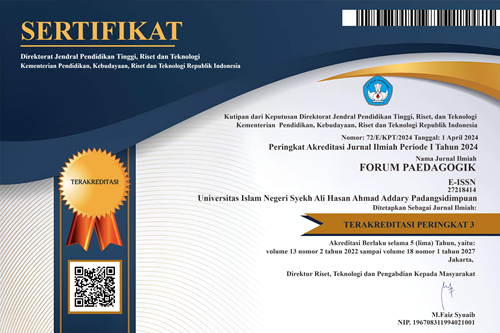THE EFFECT OF PROJECT-BASED LEARNING MODEL ON THE LEARNING MOTIVATION OF 4TH GRADE STUDENTS
The purpose of this study was to increase the motivation of science learning of fourth grade students of SDN Setia Mulya 01 Taruma Jaya Bekasi. The research method that will be used in data collection is the Quase Experiment Method. The results of this study indicate that: (1) The average value of the experimental class pretest was 80%, while the average value of the control class was 81%; (2) obtained an average N-gain for the experimental class of 0.069 and included a moderate category. While the control class obtained an N-gain value of 0.016 and included the low category. This shows that the increase in student learning motivation in the experimental class has a significant difference; (3) the results of the post-test hypothesis test with an Asymp. Sig 0.003 which means smaller than the value of a (0.05). So based on this data, the hypothesis is accepted with the conclusion that there is a significant difference in increasing student learning motivation. there is an influence on the use of the Project Based Learning (PJBL) learning model on the learning motivation of grade IV students at SDN Setia Mulya 01, this is evidenced by the results of the final hypothesis test calculation, namely Asymp. Sig < 0.05 (0.003 < 0.05) which means there is a significant difference. Based on the average value of learning motivation in students, the experimental class gets an average of 85% while the average value of the control class is 79%, this shows that the use of the Project Based Learning (PJBL) learning model has a significant effect on student learning motivation.
Keywords : Project Based Learning; IPAS; Learning Motivation.
- Agus, M. (2021). The Effect of Project Based Learning Model (PJBL) on Learning Motivation of VII Grade Students in PAI Subjects at Smp Insan Rabbany Bsd, Arifianti, U. (2020). Project Based Learning in Science Learning. Journal of Sebelas Maret University, 3, 2081.Astawan, G. & Agustina, I. G. A. T. (2020). Elementary School Science Education in the Era of the Industrial Revolution 4.0 (Bali: Nilacakra Publishing House).Fathurrohman. (2016). Innovative Learning Models: Alternative Learning Designs that are fun.Rahayu, A. (2022). M. Si. Population and Sample, (Jakarta: Binus).Rianto. (2005). The Key to Success that Never Fails, (Jakarta: PT Gramedia Pustaka Utama).Rosalina & Linda, dkk. (2023).Textbook of Statistics. (Padang: CV Muharika Rumah Ilmiah).Saefudi. (2014). Effective Learning (Bandung: Remaja Rosdakarya).Samatowa & Usman. (2016). Science Learning in Elementary School (Jakarta: Indeks Gramedia Group). Sardiman, A. M. (2016) Interaction and Motivation for Teaching and Learning, (Jakarta: Raja Grafindo Persada)Sidiq, U. (2018). Ethics & Teaching Profession (Tulungagung: STAI Muhammadiyah Tulungagung).Sidiq, U. (2019). Policy of the 9-Year Compulsory Basic Education Program at Pondok Pesantren Salafiyah Islamic Centre BIN BAZ Yogyakarta (Ponorogo: CV Nata Karya).Sugiyono. (2014). Educational Research Models Quantitative, Qualitative, and R&D Approaches. Bandung: Alfabeta.Thobroni, M. & Mustoga, A. (2013). Learning & Learning (Yogyakarta: Ar-Ruzz Media).Yanti, V. (2020). Learning science with inkuiri learning strategy to improve students' process skills and learning motivation in elementary school..
 Copyright (c) 2024 Aina Isma Salsabila
Copyright (c) 2024 Aina Isma Salsabila

This work is licensed under a Creative Commons Attribution-ShareAlike 4.0 International License.











